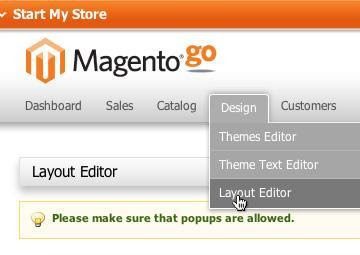If you make your living in the world of e-commerce, and especially if you’re a Magento customer, you have likely heard the surprising announcement that eBay—the parent company of Magento—is discontinuing Magento Go. For small-to-medium-sized businesses, Magento Go has long provided a cost-effective and user-friendly platform for managing online stores, and with the forthcoming elimination of this service, existing customers are left only with Magento Enterprise and Magento Community Edition, neither of which is designed with small businesses in mind. So, of course, questions remain: Why is Magento Go Closing? And how can existing Magento Go customers keep their stores afloat?
A Bit about Magento Go
Launched in February of 2011, Magento Go is the company’s middle-of-the-road shopping cart service. Since its inception, Magento Go has proven a popular competitor in the small business market for its flexibility (the service offers multiple tiers of membership to accommodate businesses of varying sizes and goals), its affordability, and its ease of use. Since the service is cloud based, users have no need to download software or host their own stores.
In the same month that Magento Go first launched, eBay announced that it had made a sizable investment in Magento, Inc., and possessed a 49-percent ownership stake in the country. By June of 2011, eBay maintained 100-percent ownership. This is an important point to emphasize, because it was ultimately eBay’s decision to pull the plug on Magento Go. The online auction giant had originally purchased the company in the hopes that it could create a natural transition point for larger, more successful eBay stores.
Some of the biggest eBay stores were already transitioning to eCommerce platforms like BigCommerce and Volusion, which enable them to manage their inventory for less money and with greater freedom. As a means of capitalizing on this trend, eBay sought out a platform that was closely aligned with its own vision, and thus, the eBay-Magento merger was born.
Trouble in Paradise
Unfortunately, eBay has proven unsuccessful in capturing its desired market segment with Magento Go. It’s not that the service isn’t popular, but as the cliché goes, there are just too many chefs in the kitchen. Magento Go has been forced to compete with a slew of older and more established SaaS (Software as a Service) platforms like BigCommerce, Volusion, and Shopify, and in recent years, other high-profile competitors like Yahoo and Amazon have also joined the fray, further chipping away at Magento’s already decreasing market share. For eBay, the strategy now appears to be a return to form, focusing the breadth of its resources on the platforms that made Magento an e-commerce world leader: Community and Enterprise.
There are, of course, other contributing factors to the demise of Magento Go. For starters, the platform is highly restrictive in its front-end design and development when compared to similar services. For anyone with a cursory knowledge of Web development, the Community Edition was always the preferred choice anyway, because it is fully customizable and costs nothing to use. In fact, so popular is Magento Community Edition that there’s just no way to eclipse it without damaging the brand value of the company as a whole. So maybe you’re wondering, should I just switch to Community or Enterprise?
Magento Community vs Enterprise
If you already use or have considered using Magento Go, it’s a safe bet that the Community and Enterprise editions will not adequately meet your needs. The Community Edition is free to use, but it is created largely with designers and developers in mind and requires separate Magento hosting. It offers no support from the company, and offers none of the marketing features, conversion optimizations, design customizations or SEO configurations that you would enjoy with an alternative SaaS for as little as $15 per month.
Magento Enterprise plans start at over $15,000 a year, so unless your business is earning at least 7 figures of revenue, it’s probably not the wisest investment, even with its incredible wealth of features and support. Enterprise is one of the best e-commerce solutions for multi-million-dollar businesses, which is one of the reasons why eBay is working to allocate its resources away from Magento Go. With only 10,000 stores, Go just can’t come close to competing with Enterprise in terms of profit potential.
I’m a Magento Go Customer – What Do I Do Now?
Unfortunately, the Magento Go cancellation will inevitably create some headaches for users. Magento is attempting to minimize these headaches by working with BigCommerce to transition its existing customers. BigCommerce is one of the world leaders in the SaaS e-commerce game, and offers even better service at comparable prices. Mark Lavelle, the senior vice president of product and strategy at eBay Enterprise, said in a statement that “we chose Bigcommerce to help with the transition because of their shared commitment to client success and their proven track record of migrating large groups of merchants onto their platform.”
BigCommerce remains one of the top solutions for small-to-medium-sized businesses, with its unparalleled SEO compliance, myriad marketing tools, stunning visual templates, bank vault security, fully customizable coding (CSS and HTML), dozens of credit card gateways and innumerable plug-ins and extensions. BigCommerce is one of the most versatile e-commerce platforms on the market, and since the company caters largely to small and medium-sized businesses and has more than 50,000 stores under its belt, it won’t be going away anytime soon.
Finding Your Best Alternative
At Coalition Technologies, we routinely work with all major e-commerce platforms, from the simplest open-source solutions to the most expansive big-business powerhouses. After years of firsthand experience, we have determined that BigCommerce is #1 in terms of SEO, or the standards and practices by which a website is able to achieve prominent search engine rankings.
For local brick-and-mortar businesses looking to establish an online presence, we have found that Shopify is one of the best solutions available. Its prices are some of the best, and the platform integrates seamlessly with your existing records and analytics, allowing you to easily monitor all of your sales (both online and off) from one convenient location.
Challenges of the Migration
As previously emphasized, there are going to be some challenges with the migration from Magento Go, no matter how optimal your strategy. You must consider issues like customer accounts, account history, orders, product database, attribute sets, attributes, settings and store configurations, all of which must be carefully backed up, transferred and maintained. Aside from the data itself, any migration runs the risk of lost search engine rankings, lost authority, and even the loss of indexed pages. Ask anyone who has ever endured a website migration, and they will tell you that nobody walks away completely unscathed. The trick is minimizing the damage.
Surviving the Migration
At Coalition Technologies, we work with Magento customers every day, and we excel in helping business owners to manage, transfer and optimize their online businesses. From back-end design to seamless migration, we can help you to maintain the standings you worked so hard to earn, and to keep your full site intact as you leave behind Magento Go and embrace a new e-commerce partner. Our expert design, development and SEO teams are intimately familiar with all of the major e-commerce platforms, and we even have partnerships with BigCommerce and Shopify.
As of February 1, 2015, Magento Go will be nothing more than a memory. But your company’s best days still lie ahead. Contact Coalition Technologies at (310) 827-3890 and tell us a little bit about your business. We’ll give you a free quote and outline exactly how we can smoothly transfer your site to a new, superior e-commerce platform, while leveraging your pages for maximum sales search engine value. You don’t have to become a Magento casualty, and you don’t have to settle for less than you deserve. Coalition can help. We have helped some of the world’s leading businesses, and we can help you, too. Call us today.



